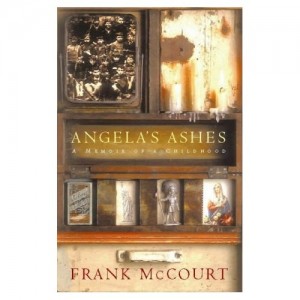Angela’s Ashes A Memoir of a Childhood
Rating: 




To take up a Pulitzer prize-winning book that has consistently sold in the millions, and appear to take it apart, may seem like an act of iconoclasm. I shall therefore begin by saying that it is one very enjoyable read. Neither did the film version ( Angela’s Ashes [DVD] [2000]) disappoint me, at least, it is one of those rarest of experiences when you sit and watch an adaptation of a book and are forced by the end to acknowledge the makers did a better job than you might have done, despite “two and a half hours of rain”..
The book quote on the back neatly summarises the contents: “When I look back on my childhood I wonder how I managed to survive at all. It was, of course, a miserable childhood: the happy childhood is hardly worth your while. Worse than the ordinary miserable childhood is the miserable Irish childhood, and worse yet is the miserable Irish Catholic childhood”.. You can see why this quote was chosen over any other to sell the book, it combines the comfortable certainty of a publisher with another abused child story on the desk, with the skeptical but human reaction, ‘I bet it wasn’t really as bad as all that.. was it?’
In one respect the success of the book is formulaic, the genuine pleasure we gain from a story where the main character overcomes the trials and tribulations of life to emerge from the chrysalis mature, reflective, but above all, relatively unscathed. Since all of us, to a greater or lesser extent, know by personal experience that life simply is not so cut and dried; we enjoy the myth, but remain mildly unconvinced.
To begin to relate the dozens of novels and biographies where I could make a similar case would be pointless, but here are a few that come to mind, regardless. David Copperfield by Charles Dickens (or indeed, any one of a dozen of his characters), Moll Flanders by Daniel Defoe, Crime and Punishment by Fyodor Dostoevsky, and closer to home, A Portrait of the Artist as a Young Man by James Joyce.
The poor, sentimental childhood industry is certainly alive and well in the hands of Frank McCourt. Ireland has long provided a rich mother lode for writers and artists, perhaps because of the horrific famine and subsequent Irish diaspora, not to mention the effects of two world wars, punctuated by a civil war. The overseas Irish nowadays help fund the inexhaustive market, and of course, there is the ‘perfidious’ English across the Irish Sea. As long as we buy the myth, the myth becomes history.
As if this wasn’t enough, the book contains as many human clichés, the poverty-struck alcoholic father, the pious, nagging, depressed mother, the predatory cousin/lodger, the harsh priests, the bullying schoolmaster, and the kind, supportive neighbours.
All in all, a number of issues begin to surface. For most people, memories of childhood inevitably appear through the prism of later experience, not to say the experience of reading about the childhoods of others. As many a professional would admit, ‘don’t let an inconvenient fact get in the way of a good story’, but when does fact give way to fiction? At what point does a novel legitimately sell as a memoir? Why do we appear to prefer it that way?
The Actor Richard Harris was born in Limerick. He commented:
“I knew Frank in his New York days and I found him.. the most bitter human being I have ever met in my entire life.. I believe that he hated me with a passion because according to him I came from an elitist part of Limerick and because I became so successful.. If Limerick is, as he claims, a city of begrudgers why then they did they give him an Honorary Doctorate at the University of Limerick and why did the Mayor propose making him a Freeman of Limerick? Are these the acts of begrudgers?”
‘So why does Harris believe that McCourt hates Limerick?’
“I really don’t know. I agree that there are stories about Limerick in ‘Angela’s Ashes’ that just don’t make sense. Of course I knew that the poverty was going on but I also knew many people with difficult lives who grew up on the lanes of Limerick but yet, even to this day, there isn’t one ounce of bitterness in them..”
I will conclude my own argument with a 1933 quote from a historian, Julius Pokorny, whose ‘History of Ireland‘ I shall return to in time, ‘It is inevitable that in dealing with a subject so controversial as modern Ireland, where the facts and the inferences from the facts are so fiercely disputed, (the author) should encounter some dissent. From (where) in any country is perfectly accurate information to be obtained?’
Comments of Richard Harris found in:
FROM BARDS TO BLACKGUARDS: LIMERICK AND THE ART OF STORYTELLING by Gerard Hannan (2001)

Funny, funny, funny. Even when he was at ebb tide, McCourt managed to tell his tales with “a comic eye, a sympathetic heart and the perfect timing of a master storyteller.”